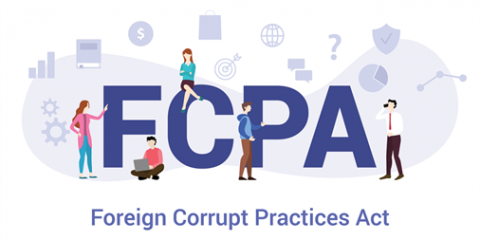
<h1>Overview of the FCPA </h1>
“The Foreign Corrupt Practices Act of 1977 (FCPA) is a United States federal law that prohibits U.S. citizens and entities from bribing foreign government officials to benefit their business interests.” The FCPA is applicable worldwide and extends specifically to publicly traded companies and their personnel, including officers, directors, employees, shareholders, and agents. Following amendments made in 1998, the Act also applies to foreign firms and persons who, either directly or through intermediaries, help facilitate or carry out corrupt payments in U.S. territory.
<h2>Origin of the Act</h2>
After President Nixon’s election campaign, questionable or illegal payments made by 400 US companies resulted in the bribing the foreign government officials, politicians, and political parties up to 300 million. If the official has no choice but to bribe, and bribery is legal in the country, bribing is seen as necessary for "greasing the wheels", i.e. facilitating or easing the conduct of the business or to run the business in a smooth manner. Congress enacted the FCPA to bring a halt to the bribery of foreign officials and to restore public confidence in the integrity of the American business system. The Act was signed into law by President Jimmy Carter on December 19, 1977.
<h3>Applicability and Enforcement of the Act</h3>
FCPA is applicable to publicly traded/listed companies and their personnel, including officers, directors, employees, shareholders, and agents. Domestic companies and US Citizens and Residents Persons/entities of other countries to the extent it leads some nexus with US person or use of US systems for bribing foreign officials. The FCPA is jointly enforced by the Department of Justice (DOJ) for Bribery related provisions & Securities and Exchange Commission (SEC) for accounting related provisions.
Two provisions as per FCPA are as follows: -
<li>Anti-Bribery Provision-</li> The antibribery provisions of the FCPA make it unlawful for a U.S. person, and certain foreign issuers of securities, to make a corrupt payment to a foreign official for the purpose of obtaining or retaining business for or with, or directing business to, any person.
<li>Accounting records and control-related provisions-</li> Books and Records to reflect financial transactions & Maintaining Accounting Internal Controls: The accounting provisions, often referred to as books and records or internal control provisions, essentially requires companies to create and use regular bookkeeping, accounting, internal controls, and compliance procedures sufficient to identify and prevent potential FCPA violations.
<h3>Impact of the FCPA </h3>
The Foreign Corrupt Practices Act prohibits U.S. related persons from taking bribes. The core aim of the Foreign Corrupt Practices Act (FCPA) is to prohibit companies and their individual officers from influencing foreign officials with any personal payments or rewards. The objective of implementing this act is to reduce the practice of bribery to expedite the business processes. FCPA applies to any person who has a certain degree of connection to the United States and engages in corrupt practices abroad, as well as to U.S. businesses, foreign corporations trading securities in the U.S. FCPA governs not only direct payments to foreign officials, candidates, and parties, but payments made to any other recipient in furtherance of influencing a foreign official, candidate, or party. These payments are not restricted to monetary forms and may include anything of value.
<h4>Amendments to the Act</h4>
The Act was first amended by the Omnibus Trade and Competitiveness Act of 1988, where Title V is known as the 'Foreign Corrupt Practices Act Amendments of 1988'.
It introduced a "knowing" standard to find violations of the Act, encompassing "conscious disregard" and "willful blindness." Other amendments were for "bona fide", "reasonable" and lawful gifts under the laws of the foreign country.
The second amendment was the International Anti-Bribery Act of 1998 which was designed to implement the OECD Anti-Bribery Convention—i.e., to include certain foreign persons and extending the scope beyond U.S. borders.
<h4>Penalties defined in the FCPA</h4>
Criminal Penalties of anti-bribery violations –
a) Up to $2,000,000 for corporations and other business entities
b) Up to $100,000 for officers, directors, stockholders, employees, and agents of such entities
c) Imprisonment for up to five years for individuals mentioned in (b) above.
d) The statutory fines can be significantly increased under the Alternative Fines Act, up to twice the benefit that the defendant sought to obtain by making the corrupt payment.
<a href="https://en.wikipedia.org/wiki/Foreign_Corrupt_Practices_Act">Source</a>
<h4>Few Companies/ Persons penalized for non-compliance under the law </h4>
<b>Goldman Sachs Group, Inc.-</b> The firm agreed to pay more than $1 billion to settle SEC charges that it violated the anti-bribery, books and records, and internal accounting controls provisions of the FCPA in connection with the 1Malaysia Development Berhad (1MDB) bribe scheme.
<b>Herbalife Nutrition, Ltd.-</b> The Los Angeles-based direct selling company agreed to pay more than $67 million to resolve charges that it violated the books and records and internal accounting controls provisions of the FCPA arising out of a bribery scheme orchestrated by its China subsidiary.
<b>Cardinal Health-</b> Ohio-based pharmaceutical company Cardinal Health, Inc. agreed to pay more than $8 million to resolve charges that it violated the books and records and internal accounting controls provisions of the FCPA in connection with its operations in China.
<b>Alexion Pharmaceuticals-</b> Boston-based pharmaceutical company Alexion Pharmaceuticals Inc. agreed to pay more than $21 million to resolve charges that it violated the books and records and internal accounting controls provisions of the FCPA.
<a href="https://www.sec.gov/spotlight/fcpa/fcpa-cases.shtml">Source</a>
RiskPro offers FCPA awareness training and compliance reviews & anti-bribery corruption training. For more details on our services, please connect with us at info@riskpro.in
Blog Authored- Raj Kapadia from Riskpro India
